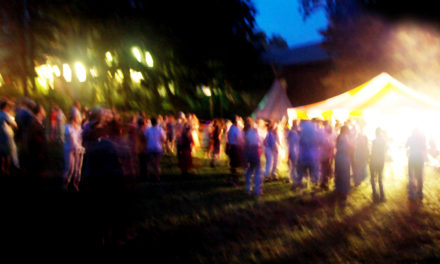An interview with Sacred Fire LifeWays provider Prema Sheerin reveals the vital energies and gifts of each of the ‘elemental emotions’ that are meant to provide for a healthy ecosystem in every human being. These elemental emotions are happiness, fear, anger, sympathy and grief. This post addresses fear, which is traditionally associated with the season of Winter. Prema Sheerin is the presenter for two of Sacred Fire’s LifeWays programs.
 Fear has been given a bad rap. In fact, our biggest fear is fear itself. As we are entering into winter (at least in the Northern Hemisphere), Around The Fire asked Prema Sheerin to give us some insight about how to move effectively with fear.
Fear has been given a bad rap. In fact, our biggest fear is fear itself. As we are entering into winter (at least in the Northern Hemisphere), Around The Fire asked Prema Sheerin to give us some insight about how to move effectively with fear.
Around the Fire: Prema, can fear really be good for us to feel?
Prema: Yes it is. We tend to look at fear as a negative experience, but actually it is a really important elemental messenger for us. The balanced expression of fear shows us that we are in some kind of an immediate danger and that we need to either flee or freeze to protect ourselves. Where the problem starts is when there is an imbalanced expression of fear. This is what happens when our mind either amplifies the experience of fear by dwelling on all the uncertainties of our future – on fears about what we are going to lose or what we can’t control – or the mind can actually generate fear, with its own predictions or fantasies about impending doom. So a vast majority of fear, worry, and anxiety that we experience is mind-amplified fear, not the balanced expression of fear.
ATF: What causes this imbalanced expression of fear? Why do we experience it?
Prema: Well, basically that comes down to one of two things. The first is our fear of loss. We humans with our cognitive minds are hard-wired to avoid loss. It’s a survival mechanism for us. We use our cognitive mind to separate and assess and categorize. We then take experiences from the past and project them into the future. All of this is an important survival strategy for us to either create gain in order to avoid loss, or to avoid loss in order to survive. We are inherently afraid of the experience of loss, whether it is loss of material wealth, loss of our capacities, or the scariest loss of all: the loss of human connection. We humans are social beings. We are absolutely wired to be in relationship with each other. We get our needs met more effectively in connection with each other than when we are on our own. So one of the greatest fears for us is the loss of connection, the loss of our tribe.
The second reason for this imbalance is our fear of fear itself. We are afraid of our fear, particularly mind-amplified fear, because it is very uncomfortable. It doesn’t feel good when our imagination amplifies our fear but there is nothing real out there to respond to. So we think about what we are afraid of, and we keep thinking about it and about how we can control the environment. The more we do that, the less control we experience and the more fear we feel. This becomes a vicious cycle of anxiety and worry.
ATF: Wow, what can someone do about all that anxiety and worry and downright fear? I think there is a lot of that going around right now with so much uncertainty in different parts of the world. It doesn’t even matter which “side” one is on when it comes to conflicting views or political leanings.
Prema: We don’t need to address the balanced fear. It is there for a reason.
We DO need to address, acknowledge and attend to the imbalanced fear.
We live in a culture that has given enormous precedence to the importance of the mind. The cognitive mind performs the function of separating, dividing, and categorizing, and so the enormous emphasis on this part of ourselves that creates separation makes us inherently more afraid. We are creating the very separation that we most fear. This is a real paradox for us in modern culture.
It is really important, then, to know how to attend to the fear itself. And when I say, “attend to the fear,” what I am pointing to is the way we are afraid of the fear and try to ignore it instead of taking care of it. One of the skills we need to develop is to focus on the experience of fear itself rather than trying to manage and control the object of our fear. So we can say to ourselves: “What am I feeling right now? Oh, I am feeling fear. Where do I feel it in my body? In my belly, my heart…” Then, rather than thinking, “How can I control the situation out there so I can control the fear in here?” we can instead offer our love, our compassion, our acceptance to that experience of fear. We can soothe ourselves, acknowledge the fact that we are experiencing fear and that it is ok to be afraid.
When we offer love and compassion to our fear, it connects us to our Heart. One of the fundamental laws of Life is that when we are given a scary circumstance to face, we are also given the courage to face it. Where do we find our courage? We find it in the Heart. So when we connect with the love and compassion that is present in the awareness of our Heart, we also gain access to the courage that is there to face the fear. This is one of the most effective ways to manage mind-amplified fear. What I notice is that when I work with people in this way, it is amazing how it can short-circuit the process of the downward spiral of avoiding fear and thinking about it instead, which then generates more fear, which we then try to avoid and distract ourselves from. So this process allows us to look back at the circumstance that we were afraid of and see it from a completely different Heart perspective, where it feels manageable, where we are connected to the inner resources that will allow us to manage the circumstances that life has offered.
ATF: “Offering love and compassion to fear.” I am guessing that would sound counter-intuitive to many readers.
Prema: Yes, but I really want to emphasize it. So often, you will get the message that it is important to acknowledge your fear, to face it. And of course, that is better than suppressing your fear, which is another way that fear gets out of balance. But emotion will always find expression and, if we don’t acknowledge it, that emotional energy will drive the mind like the wind that turns the wheel of a windmill around and around. Yet, in my experience, the thing that absolutely makes the difference, that connects people to their Heart and gives them access to their courage, is to offer love and compassion to their fear. It is a way to connect to the authentic experience of the present moment, and this gives rise to intelligence far beyond that of the cognitive mind. Balanced emotion gives rise to wisdom and effective action because it arises and subsides in the Divine presence and movement of Heart Awareness, connected to all.
There is one more antidote to fear, if you will. It is to come sit around Fire, because Fire is the element of connection, of Heart and it absolutely addresses that fundamental fear of being separated from our tribe that we all carry. So to come and sit together around the Fire is one of the greatest ways to assuage our fear.
ATF: Prema, thank you so much for giving us these important insights about the nature of fear in both its balanced and imbalanced expressions. We look forward to speaking to you again in the future in order to explore some of the other elemental emotions.
Prema: You are most welcome, and I look forward to sharing more in the future.
Learn more about LifeWays, Sacred Fire’s series of programs that offer healing from our disconnection from nature, self, and community that have crept into human life over recent centuries.







